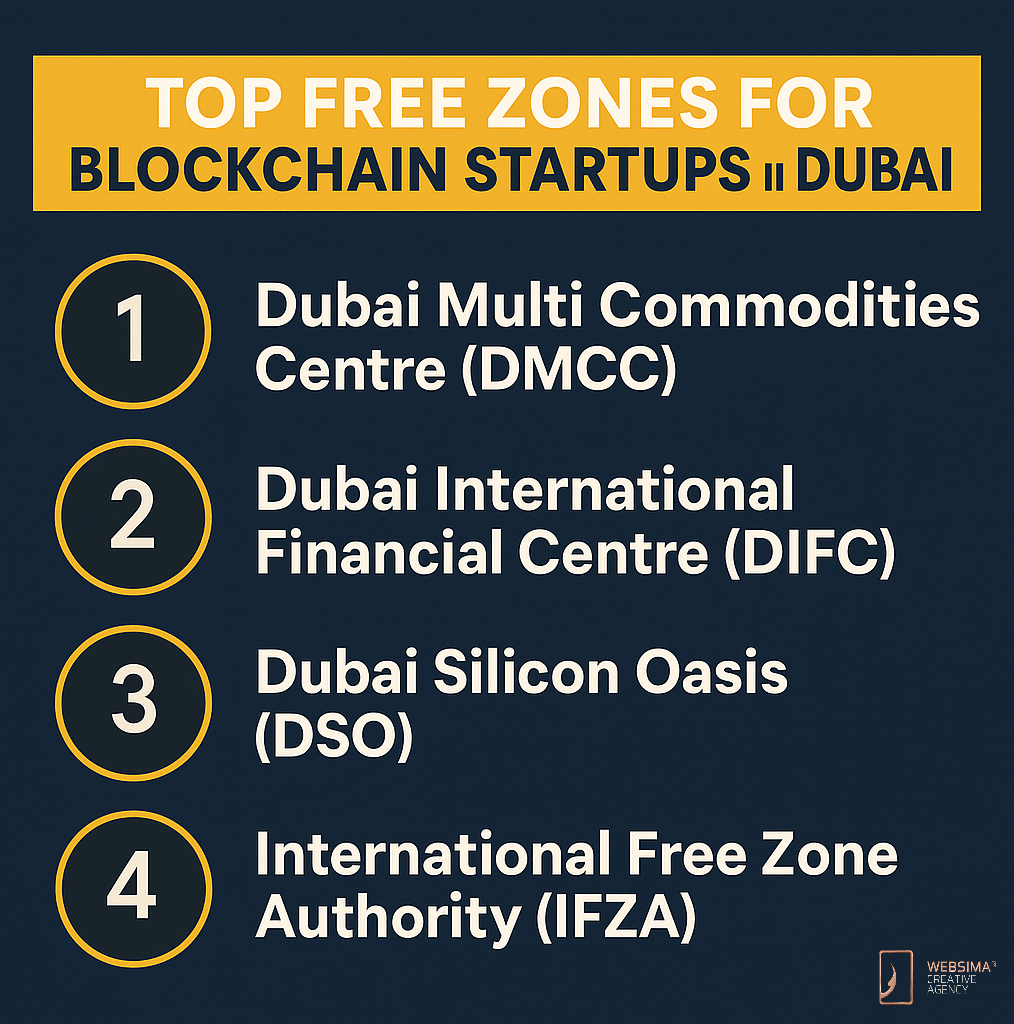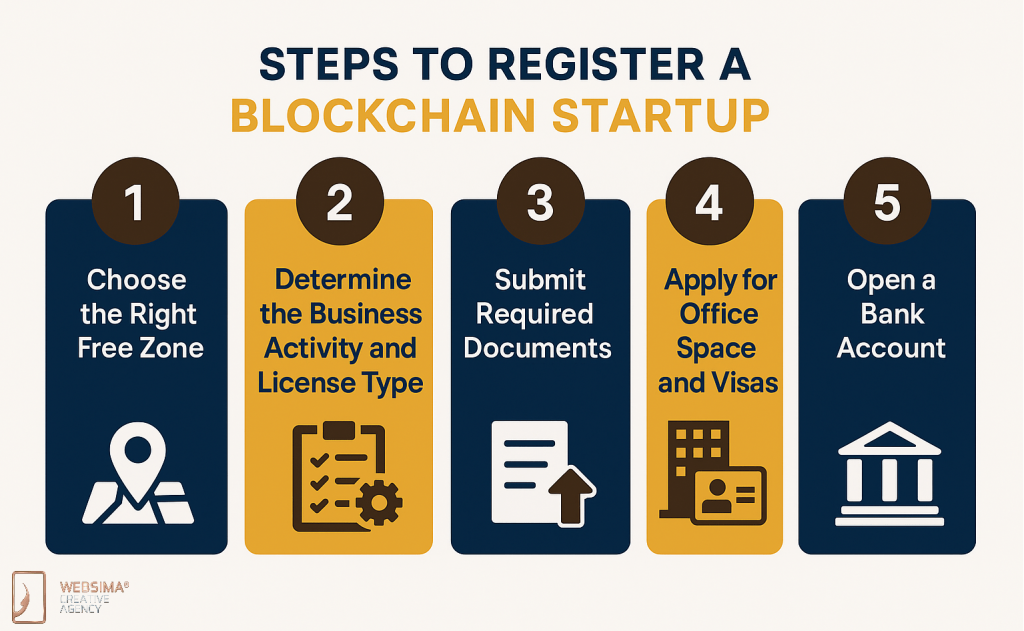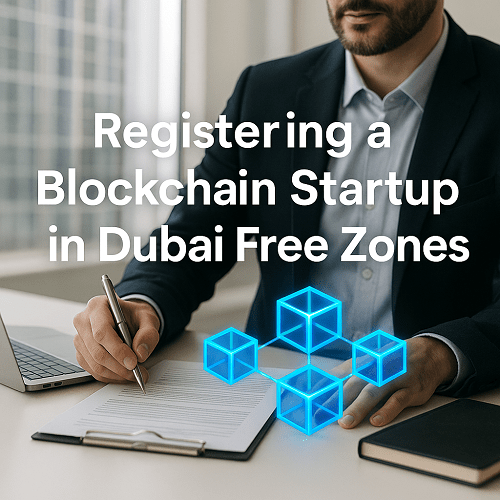Dubai has rapidly positioned itself as a global center for blockchain innovation, attracting entrepreneurs, developers, and investors from around the world. The city’s proactive regulatory framework, business-friendly environment, and tax advantages have created the ideal conditions for launching blockchain-focused ventures. One of the most strategic pathways for Web3 founders is establishing their entity within a Dubai free zone—an economic jurisdiction designed to facilitate innovation and foreign investment.
In this in-depth guide, we’ll explore everything you need to know about blockchain registration in Dubai, particularly within its growing network of free zones. From legal requirements and licensing categories to cost breakdowns, supported activities, and compliance with virtual asset regulations, this article outlines a complete roadmap to launching your blockchain business in the UAE.
Why Choose Dubai to Launch Your Blockchain Startup?
Yesterday, our Growth Associate Elise Baratte attended “Setting Up in Dubai: Crypto Regulations and Business Growth” hosted by @VARADubai and @dmcccrypto!
A packed session on why Dubai is the place for crypto and RWA tokenization
Here’s what you need to know
1/ A thread… pic.twitter.com/OXEo3L8KPX
— Defactor (@defactor_) April 29, 2025
Global Reputation Meets Local Support
Dubai ranks among the world’s most forward-thinking cities when it comes to emerging technologies. Backed by initiatives like the Dubai Blockchain Strategy, the city aims to lead in digital transformation by embedding blockchain into key sectors including finance, logistics, real estate, and identity verification.
Furthermore, the launch of the Virtual Assets Regulatory Authority (VARA) in 2022 marked a world-first move—Dubai became the only city to introduce a dedicated regulator for virtual assets and blockchain entities.
✅ Learn more about VARA: https://vara.ae
Benefits of Blockchain Registration in Dubai Free Zones
Setting up a blockchain startup in a Dubai free zone offers numerous advantages:
- 100% foreign ownership
- 0% corporate and income tax (in most zones)
- No currency restrictions
- World-class infrastructure and office spaces
- Streamlined business setup processes
- Access to talent, accelerators, and investors
Overview of Blockchain Registration in Dubai for Startups
What Is a Free Zone?
A free zone (also known as a free trade zone) is a special economic area offering benefits like simplified company formation, tax exemptions, and specific business support services. Dubai hosts over 30 free zones, several of which actively cater to Web3, crypto, and blockchain startups.
Legal Entity Types Available
Most blockchain startups register as one of the following:
- Free Zone Establishment (FZE) – One shareholder
- Free Zone Company (FZCO or FZ LLC) – Multiple shareholders
- Branch Office – For expanding international firms
Each zone may have slight variations in naming conventions, but these structures offer limited liability and legal clarity for founders.
Top Free Zones for Blockchain Startups in Dubai

1. Dubai Multi Commodities Centre (DMCC)
DMCC is one of the most prominent free zones for Web3 businesses. It launched the DMCC Crypto Centre, a dedicated ecosystem for blockchain and digital asset companies.
Highlights:
- Partnerships with Binance and CV Labs
- Licensing for trading, development, and metaverse businesses
- Tiered office spaces and flexi-desk options
- Crypto-native business support network
✅ Source: https://www.dmcc.ae
2. Dubai International Financial Centre (DIFC)
DIFC is ideal for fintech and institutional-grade blockchain startups. It operates under English Common Law and provides access to capital markets.
Highlights:
- FinTech Hive: MENA’s largest financial innovation accelerator
- Regulated entities can apply for an Innovation Testing Licence
- Suitable for crypto exchanges, DeFi protocols, and Web3 banking
- Governed by the Dubai Financial Services Authority (DFSA)
✅ More about DIFC: https://www.difc.ae
3. Dubai Silicon Oasis (DSO)
Part of Dubai Digital Park, DSO is tailored for tech innovation and hardware-software startups. It offers competitive registration fees and incubation programs.
Highlights:
- Custom licensing for software, blockchain, and smart contract development
- Integrated living, office, and academic ecosystem
- Ideal for early-stage tech entrepreneurs and dApp developers
4. International Free Zone Authority (IFZA)
IFZA offers fast, low-cost licensing and registration. It’s ideal for startups focused on consultancy, software development, or international operations.
Highlights:
- 100% foreign ownership
- Multiple visa packages and flexi-desk options
- Quick company setup (within 3–5 days)
Steps to Register a Blockchain Startup in a Dubai Free Zone

Step 1: Choose the Right Free Zone
Base your decision on:
- Type of blockchain activities you plan to offer
- Required regulatory oversight (e.g., VARA, DFSA)
- Budget for office space and visas
- Long-term scalability and licensing options
Step 2: Determine the Business Activity and License Type
Blockchain companies typically apply under categories such as:
- Blockchain Development
- Software and IT Services
- Digital Asset Management
- Crypto Consultancy
- NFT Marketplace Operations
Licensing terms vary depending on the free zone. For example, DMCC has licenses tailored for crypto trading and token platforms, while DIFC focuses on virtual asset finance and security tokens.
Step 3: Submit Required Documents
While the exact requirements vary by zone, you’ll generally need:
- Passport copies of shareholders and directors
- Business plan (especially for regulated activities)
- Proof of address and contact details
- Trade name reservation and initial application form
- No objection certificate (NOC) if the applicant is employed in the UAE
Step 4: Apply for Office Space and Visas
Free zones offer:
- Hot desks or co-working spaces (for lean teams)
- Flexi desks (budget-friendly option)
- Private offices (required for larger teams and certain licenses)
Each office option influences the number of visas you can sponsor.
Step 5: Open a Bank Account
Blockchain startups may face additional scrutiny from banks due to KYC and AML regulations. Work with free zones that offer banking assistance or partner with banks that support crypto-native businesses.
✅ Resource: Emirates NBD for Business Banking
Compliance and Regulatory Requirements
Virtual Asset Licensing from VARA
If your startup deals directly with cryptocurrencies, tokens, or NFTs, you may need to obtain a Virtual Asset Service Provider (VASP) license from VARA.
VARA License Categories Include:
- Broker-dealer
- Custodian
- Virtual asset management
- Marketplace operator
Each license comes with KYC/AML, cybersecurity, and reporting obligations.
Intellectual Property and Smart Contract Ownership
Ensure your IP rights are protected through proper registration. If your startup involves NFTs or tokenized content, legal counsel may be necessary to ensure smart contract rights and copyrights are valid in the UAE context.
Data Protection and Cybersecurity
Under UAE law, blockchain startups must comply with local data protection policies, particularly when handling user wallets, identity verification, or transaction histories.
Estimated Costs of Registration
| Item | Estimated Cost (AED) |
| Trade License (annual) | 10,000 – 25,000 |
| Flexi Desk Office Space | 7,500 – 15,000 |
| Visa Allocation (per employee) | 3,500 – 6,000 |
| Medical Test + Emirates ID | 1,200 – 2,000 |
| Name Reservation & Initial Setup | 2,000 – 5,000 |
| VARA License (if applicable) | Varies by activity |
Note: Costs vary by free zone and services selected.
Government and Private Support for Blockchain Startups
Incubators and Accelerators
- FinTech Hive (DIFC)
- DMCC Crypto Centre Accelerator
- Startupbootcamp Dubai
- Crypto Oasis Ecosystem
These programs offer mentorship, funding, networking, and office space.
Grant Opportunities
UAE government entities like the Dubai Future Foundation and Mohammed bin Rashid Innovation Fund offer grants or soft loans to Web3 startups focused on education, sustainability, or public sector integration.
Common Challenges and How to Overcome Them
Regulatory Complexity
Understanding when you need a VARA license, DFSA registration, or standard trade license can be confusing. Always consult a legal advisor or a professional service provider like Websima.
Banking Hesitancy
Some traditional banks remain cautious of blockchain startups. Partner with zones or advisory firms that have existing relationships with crypto-friendly banks.
Hiring Blockchain Talent
While Dubai attracts global tech professionals, demand for smart contract developers and blockchain architects is high. Leverage remote teams, attend blockchain events, and offer competitive packages.
Dubai’s Outlook as a Blockchain Business Hub
Dubai continues to lead the MENA region in blockchain adoption due to:
- Strong government backing
- Favorable regulatory ecosystem
- Global events like Future Blockchain Summit and World Blockchain Expo
- Institutional acceptance of tokenization and digital finance
With strong regional positioning and a clear legal structure, blockchain startup registration in Dubai is now seen as both practical and strategic.
Launch Your Blockchain Startup in Dubai with Websima
At Websima, we specialize in guiding blockchain entrepreneurs through the entire process of startup registration in Dubai free zones. From business structuring and license acquisition to technical development and legal compliance, we offer an end-to-end solution tailored for Web3 ventures.
Here’s how we help:
- Free zone selection tailored to your blockchain activity
- End-to-end company formation and documentation
- Assistance with VARA and DIFC licensing
- Custom blockchain development services (smart contracts, wallets, dApps)
- Ongoing regulatory compliance and banking advisory
Whether you’re building the next NFT marketplace, token platform, or DeFi protocol, Websima is your trusted launch partner in the UAE.
Start your blockchain business in Dubai today — get in touch with us for expert guidance and tailored solutions.





